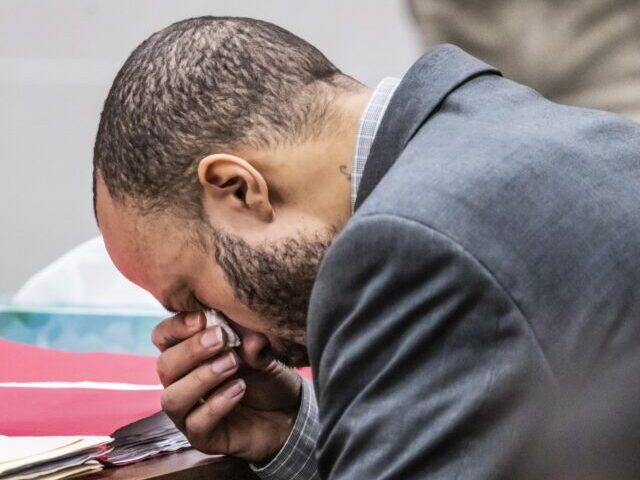Darrell Brooks — the man accused of driving his SUV through a Christmas parade in Waukesha, Wisconsin, last year — has been convicted on all six counts of first-degree intentional homicide, after a tumultuous trial where the aspiring rap artist represented himself and made a mockery of the proceedings.
A person in the gallery was removed from court after yelling “burn in hell you piece of sh*t” as #DarrellBrooks’ guilty verdict was read. pic.twitter.com/LinCR5wmam
— Law&Crime Network (@LawCrimeNetwork) October 26, 2022
A jury found Brooks guilty Wednesday morning of all 76 charges against him — including reckless endangering safety, hit-and-run involving death, bond jumping, and battery — with each count of homicide carrying a mandatory life sentence in prison. Just days before the parade massacre, Brooks had been released from prison on a mere $1,000 bail thanks to lenient Milwaukee County DA policies. It took the jury a little over three hours to reach its verdict.
Brooks, wearing a suit and tie, quietly leaned his bowed head on folded hands as the verdicts were read. His demeanor was a stark departure from previous days of the trial, when his sometimes outrageous behavior drew rebukes from the judge. He declared himself a “sovereign citizen,” refused to recognize his legal name as his own, and regularly fought with Judge Jennifer Dorow. In the final week of the trial, he piled up boxes of files to hide his face from the court’s cameras. He also tossed his copy of the jury instructions into the garbage.
Brooks drove his Ford Escape into the Christmas parade in Waukesha in suburban Milwaukee on Nov. 21 moments after fleeing a domestic disturbance with his ex-girlfriend, prosecutors said.
Six people were killed, including 8-year-old Jackson Sparks, who was marching in the parade with his baseball team, and three members of the Dancing Grannies, a group of grandmothers that dances in parades. Dozens of other people were hurt, some severely.
The incident deeply scarred the community of 70,000 people about 16 miles (25 kilometers) west of Milwaukee. Community members built memorials to the dead and held vigils. The anger was still evident Wednesday; someone in the gallery yelled “burn in hell” as the verdicts were read.
Brooks pleaded not guilty by reason of mental disease this year but withdrew the plea before his trial began with no explanation. Days before the trial started, he dismissed his public defenders, electing to represent himself.
District Attorney Susan Opper called to the stand police officers and paradegoers who testified they saw Brooks behind the wheel of the SUV.
Brooks struggled to mount a defense, launching into meandering cross-examinations, refusing to recognize his own name or the court’s jurisdiction over him, and muttering under his breath that the trial wasn’t fair.
He got into such intense arguments with Judge Jennifer Dorow that several times during the lead-up to jury selection she moved him into another courtroom where he could watch the proceedings via video and she could mute his microphone when he became disruptive.
One day after he was removed to the other courtroom, he stripped off his shirt and sat bare-chested on the defense table with his back to the camera.
Opper told jurors during her closing arguments Tuesday that Brooks’ refusal to stop once he entered the parade route shows he intended to kill people.
Dorow allowed Brooks back into the main courtroom to deliver his closing to jurors face to face. In a rambling, repetitive speech, he tried to raise doubts about whether the SUV’s throttle malfunctioned and whether the driver simply panicked. He lamented how he hasn’t been able to see his children since he was arrested and insisted he’s not a murderer.
Opper countered during her rebuttal that a Wisconsin State Patrol vehicle inspector testified earlier that the SUV was in good working order. She warned jurors that Brooks was just trying to play on their sympathy.
The Associated Press contributed to this story.

COMMENTS
Please let us know if you're having issues with commenting.